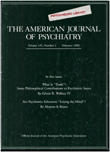One-year follow-up study of posttraumatic stress disorder among survivors of Cambodian concentration camps
Abstract
One year after receiving a diagnosis of posttraumatic stress disorder, five of 12 Cambodian concentration camp survivors who entered a treatment program no longer met the diagnostic criteria for the disorder, and symptoms in three others had improved. The intrusive symptoms of nightmares, sleep disorders, and startle reactions showed the most consistent improvement. Avoidance behavior, shame, and caring for others improved the least. The authors advocate use of tricyclic antidepressant medication and a consistent, supportive long-term psychotherapeutic commitment in treating this severely traumatized group.
Access content
To read the fulltext, please use one of the options below to sign in or purchase access.- Personal login
- Institutional Login
- Sign in via OpenAthens
- Register for access
-
Please login/register if you wish to pair your device and check access availability.
Not a subscriber?
PsychiatryOnline subscription options offer access to the DSM-5 library, books, journals, CME, and patient resources. This all-in-one virtual library provides psychiatrists and mental health professionals with key resources for diagnosis, treatment, research, and professional development.
Need more help? PsychiatryOnline Customer Service may be reached by emailing [email protected] or by calling 800-368-5777 (in the U.S.) or 703-907-7322 (outside the U.S.).



